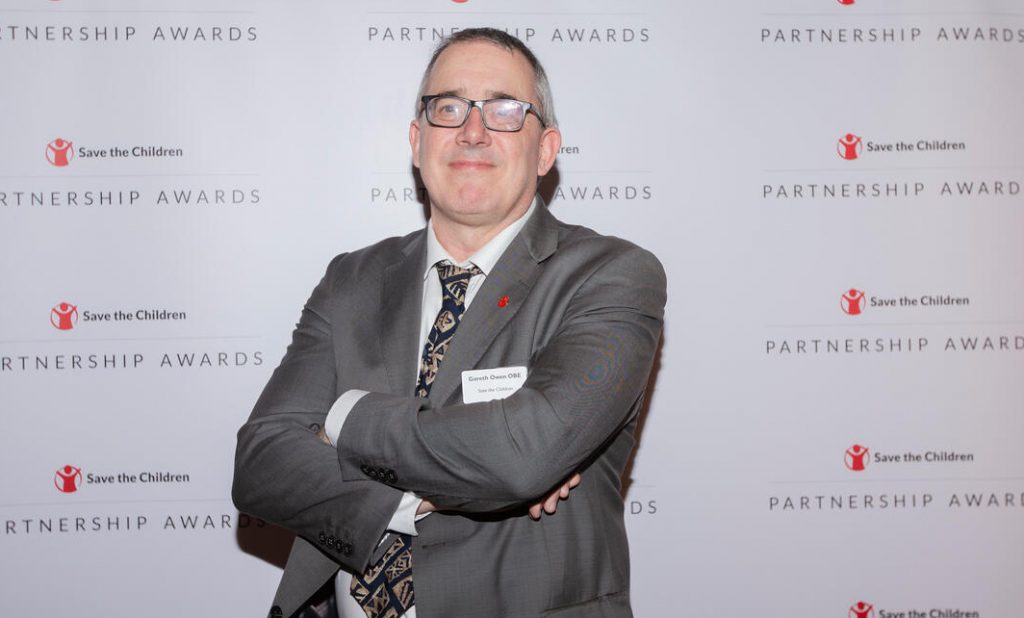2nd October 2023
I am the Humanitarian Director at Save the Children UK. I have spent the past 30 years working in humanitarian aid.
I studied civil engineering and fell into the humanitarian profession by good fortune a couple of years after graduation.
It was a big leap of faith, but one that I have never regretted.
The human spirit is incredibly strong and can overcome so much.
This is needed more than ever so I want to talk to you about the humanitarian of the future.
Modernity has led to amazing gains in knowledge, life expectancy, healthcare, cosmopolitan urban lifestyles, alongside inhuman industrial scale wars, huge inequality, deprivation, mental health epidemics and most importantly a biodiversity and environmental catastrophe that threatens our very existence.
The number of refugees and displaced persons is the highest since the second world war at over 100 million.
1 in 6 children on the planet are living in a conflict zone.
Today almost two billion have an inadequate diet and a hunger crisis is raging across the globe.
The COVID-19 pandemic has shown us that we are only ever as safe as the least safe place on earth.
Meanwhile the war in Ukraine is a watershed moment for international relations and the spectre of inter-imperial conflict looms large once more.
These are ‘wicked problems’ – socially and culturally complex, interconnected and very difficult to solve. They require collaborative solutions practised on a planetary scale if we are to free all humanity from unnecessary hardship and discrimination.
We will have to look beyond narrow self-interest and discover a new progressive internationalism.
So it is a time for big thinking and big collaboration, a time for being brave and a time for being the best possible version of you.
Humanitarians today are confronted with a world that is fast changing.
We are faced with major upheavals in global affairs and chaotic and constantly changing dynamics that render the convenient, rational constructs of traditional managerialism almost redundant.
As the aid sector has professionalised and industrialised over the past half century, so it has built thick walls of technocracy and a regime of risk management and compliance that has increasingly distanced it from those it seeks to help and its core identity.
I have learned through experience that at its most fundamental level, the soul of humanitarian aid can be boiled down to just four words: ‘hope and human connection’; this is then turned into purposeful action as a form of powerful solidarity that challenges humanity to be better for all our futures and those of generations to come.
Through experience, I have discovered ways to make a strategic virtue out of operating at the collaborative ‘outer edges’ of the aid eco-system, a place where influence through inspirational vision can flourish by raising ambition above the confines of individual agency mandates to a sense of higher collective purpose for humanity.
The art of collaboration lies in harnessing an organisation’s goodwill and support. This is not done through unproductively railing against the perceived injustices and constraints of the dominant managerial culture, but through recognising it as inevitable in the present, while finding ways to edge organisation towards a more critically reflective, eco-systemic leadership approach in the near future.
Questioning the institutional forms and the political tendencies historically associated with liberal humanitarianism is necessary to thinking through how politics of life can be part of building a more just and equal world.
Of late, the aid sector has been heavily criticised as Western centric, top down and still encumbered with the uncomfortable legacies of colonialism and white saviourism.
Indeed, in the aftermath of the murder of George Floyd, the aid sector is trying to come to terms with its own deep rooted structural racism and the need to be much more locally led in terms of agency and decision making.
As we agitate for a faster pace of reform within the traditional sector, so must we search for new ways to foster disruption and positive social change from the outside.
Therefore, for the aid sector to remain relevant in these radical times, it needs new thinking, a new leadership mindset and a much more soulful way of relating to the world it inhabits.
As individuals, we must all learn to temper the cognitive overload that so disorientates our technologically colonised minds with the rediscovery of emotional reasoning and relating.
We have to become more comfortable with holding the discomfort of ambiguity and uncertainty and learn to cherish the imperative to get somewhere different.
This will require us to step off the familiar safe path and pioneer new trails. In a world in transition, we need to constantly explore and experiment and practice persistence. This takes courage because the journey is not without fear.
But it is possible. 15 years ago a group of us set out to create the Humanitarian Leadership Academy. It was an idea that stated on a piece of paper in a coffee shop, but today it is a community of more than 700,000 users in 193 countries and more than fifty partner organisations.
Big collaboration is possible folks!
So I envisage a future in which all humanitarians are more critically reflective, self-compassionate and adept at eco-systemic leadership.
I see a new kind of adaptive constellation behaviour emerging among the next generation of humanitarian leaders.
They are agile operators with a strongly humanistic mindset who give themselves permission to organically ‘grow into the unknown’ and become the vital connective tissue the future humanitarian system needs.
They are versatile, sociable and creative; politically and philosophically engaged; instinctive networkers supportive team players and energy givers.
Are you one of them? Could you become one of them? I hope so, because the world needs you more than ever.
Resources
Books
Byung Chul Han (2015). The Burnout Society. (Stanford: Stanford University Press)
Juliano Fiori et al (2021). Amidst the Debris, Humanitarianism and the End of the Liberal Order. (London: Hurst)
Mark Fisher (2022). Capitalist Realism, Is There No Alternative? (London: Zero books)
Gemma Houldey (2021). The Vulnerable Humanitarian, Ending Burnout Culture in the Aid Sector. (Abingdon: Routledge)
Gabor Maté (2022). The Myth of Normal – Trauma, Illness & Healing in a Toxic Culture. (London: Vermillion)
Gareth Owen (2022). When the Music’s Over, Intervention, Aid and Somalia. (London: Repeater)
Michael Power (2004). The Risk Management of Everything – Rethinking the Politics of Uncertainty. (London: Demos)
Rebecca Solnit (2016). Hope in the Dark, Untold histories, Wild Possibilities. (Edinburgh: Canongate)
Bessel Van Der Kolk (2014). The Body Keeps the Score. (London: Penguin Random House)
Websites
The Alameda Institute
Oxford University Study on INGOs
Dr Simon Western, Eco-Leadership Report for The Humanitarian Leadership Academy
Podcasts
You may also be interested in
Humanitarian Xchange 2024: an event to address global humanitarian crises and solutions
Fresh Humanitarian Perspectives: podcast from the Humanitarian Leadership Academy
Gareth joined Save the Children in 2002 as an Emergency Adviser and became Humanitarian Director in 2007.
Read Gareth’s blog posts for SCUK
